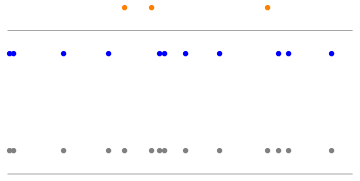I'm not sure what you mean by "exponentially distributed with parameter 0" (to me that sounds like a uniform distribution maybe?). Let's just solve the more general case instead.
$$ P(x|A) = \frac{1}{x!}A^{x}e^{-A} $$
$$ P(y|A) = \frac{1}{y!}A^{y}e^{-A} $$
$$ P(A) = \lambda e^{-\lambda A} $$
where $x$ and $y$ are positive integers and $A$ and $\lambda$ are real. Let's define the variable $z=x+y$. We look for $P(x|z=n)$. Using Bayes theorem,
$$ P(x|z=n,A) = \frac{P(z=n|x,A)P(x|A)}{P(z=n|A)} $$
Let's find what the different terms are
$$1) \ \ \ P(z=n|x,A) = \sum_{y=0}^{\infty} P(z=n|x,y,A)P(y|A) = \sum_{y=0}^{\infty} \delta((x+y)-n)P(y|A) = P(y=n-x|A) = \frac{1}{(n-x)!}A^{n-x}e^{-A}, \ n \ge x$$
$$2) \ \ \ P(z=n|A) = \sum_{x=0}^{\infty}\sum_{y=0}^{\infty} P(z=n|x,y,A)P(y|x,A)P(x|A) = \sum_{x=0}^{\infty}\sum_{y=0}^{\infty} \delta((x+y)-n)P(y|A)P(x|A) = \sum_{y=0}^{n}P(y|A)P(x=n-y|A) = \sum_{y=0}^{n} \frac{1}{y!}A^{y}e^{-A} \frac{1}{(n-y)!}A^{n-y}e^{-A} = e^{-2A}A^{n}\sum_{y=0}^{n} \frac{1}{(n-y)!}\frac{1}{y!}$$
Note the change of limits in the sum over $y$. This is because the $\delta$ has a non-zero value only if $n-y \ge 0$. Putting all together we get
$$ P(x|z=n,A) = \frac{\frac{1}{(n-x)!}\frac{1}{x!}}{\sum_{y=0}^{n} \frac{1}{(n-y)!}\frac{1}{y!}} , \ n \ge x$$
Now we must take into account that $A$ is also a random variable. However, the result we found does actually not depend on $A$, so
$$ P(x|z=n) = \int_0^\infty P(x|z=n,A)P(A)dA = \frac{\frac{1}{(n-x)!}\frac{1}{x!}}{\sum_{y=0}^{n} \frac{1}{(n-y)!}\frac{1}{y!}}, \ n \ge x$$
UPDATE:
We can continue and show that the distribution is binomial. First, we write the final expression in terms of binomial coefficients $\binom{n}{x}=\frac{n!}{x!(n-x)!}$,
$$ P(x|z=n) = \frac{\binom{n}{x}}{\sum_{y=0}^{n} \binom{n}{y}}, \ n \ge x$$
We can calculate the sum in the denominator using the binomial theorem (https://en.wikipedia.org/wiki/Binomial_theorem),
$$ (a+b)^n = \sum_{k=0}^n {n \choose k}a^{n-k}b^k$$
For that, we consider the special case in which $a=b$, in which case the expression above reduces to
$$ 2^n = \sum_{k=0}^n {n \choose k}$$
and substituting it we arrive to the final result
$$ P(x|z=n) = \binom{n}{x}2^{-n}, \ n \ge x$$
which as you expected is a binomial distribution with parameter $p=1/2$. We arrive at this special case with $p=1/2$ because the Poisson distributions of $x$ and $y$ share the same value of the parameter $A$. In the case that they were different, I expect that we would arrive to a binomial with $p=A_{x}/(A_{x}+A_{y})$, as pointed out by @whuber.

